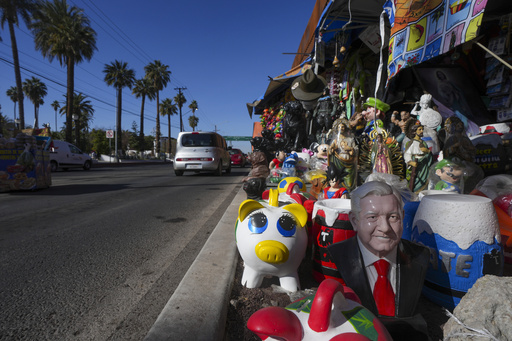
CIUDAD JUÁREZ, Mexico — As daylight breaks over the extensive border fence marking the divide between the United States and Mexico, cargo trucks filled with auto parts and electronics spring into action across the bridges, while groggy workers head to factories producing various products for the U.S. market.
This daily routine has sustained a vast transnational economic system that accounted for over $800 billion in trade between the two nations in 2024.
However, in the last year, concerns have mounted as President Donald Trump threatened 25% tariffs on imports from Mexico and Canada, casting a shadow over manufacturing centers along the northern Mexican border. This sense of uncertainty lingers, despite a temporary reprieve agreed upon by Trump recently.
The introduction of tariffs could severely disrupt Mexican border economies that depend on manufacturing goods intended for the U.S., including auto parts, electronics, and medical supplies, potentially driving Mexico into a recession, according to economic predictions. Many workers are anxious about job security, while business leaders note that the current climate of uncertainty has prompted numerous investors to tighten their financial strategies.
“It’s a clash of governments, and we’re the ones feeling the repercussions,” expressed 58-year-old truck driver Carlos Ponce while resting against his truck at the customs crossing between Ciudad Juárez and El Paso, Texas. “Who knows what tomorrow holds?”
Ponce, who transports car shock absorbers, has dedicated 35 years to moving goods across the border, following in his father’s footsteps. Now, he faces uncertainty about the future of his job.
Manufacturing in export-driven assembly plants, known as maquiladoras, forms the backbone of Ciudad Juárez’s economy, with 97% of their products headed for the U.S., as reported by Mexico’s Economic Ministry.
These factories emerged in the 1960s to stimulate economic growth in northern Mexico and lower consumer prices in the U.S. Their expansion accelerated after the 1994 signing of the North American Free Trade Agreement (NAFTA), which was later replaced by the United States-Mexico-Canada Agreement (USMCA) during Trump’s administration.
Bright signage displaying the dollar-to-peso exchange rate illuminates the city, underscoring the economic interconnections that bind both nations.
“Whatever happens in the U.S., whether in its economy or social policies, directly impacts us because Mexican companies rely on sales in the United States,” said Thor Salayandia, who operates a family business manufacturing auto parts in Ciudad Juárez. “Yet the U.S. seems not to recognize the vital role Mexico plays in its manufacturing.”
Workers and business representatives expressed relief earlier this week when Mexican President Claudia Sheinbaum announced a one-month deferral of tariffs following negotiations with Trump.
“We’ve bought ourselves some time,” said Salayandia.
In this border city, workers are involved in assembling a wide range of products, from automobile components and computer panels to T-shirts featuring American flag designs and iconic sports team logos.
It is common for parts to cross the border multiple times before reaching consumers in the U.S., revealing the intertwined economic reliance that leaves many residents unsure of a future without it. One U.S. business indicated it may shift a portion of its manufacturing back to the U.S., but likely at substantial costs.
Antonio Ruiz, a compliance officer at Tecma, a company that aids foreign firms in establishing operations along the border, noted that economic forecasts predicting a recession have compelled many businesses to convene emergency meetings in response to the tariff threats.
“It’s challenging to prepare for an unprecedented situation,” Ruiz remarked. “No matter the efforts to ready ourselves, the best we can do is brace for impact in the short run.”
Salayandia, along with economists, warns that the implementation of any tariffs could result in widespread unemployment and rising prices across both borders. In Mexico, they fear it could exacerbate violence in border regions as the unemployed may turn to drug cartels, as well as increase migration to the U.S.
Manuel Sotelo, a leader within Mexico’s National Chamber of Freight Transportation and an owner of a fleet of trucks crossing the border daily, perceives the tariff threats more as a political strategy than a forthcoming economic scenario.
“Both nations would find themselves in a standstill,” said Sotelo, who was surrounded by local papers with large headlines about the tariffs and a Trump bobblehead on his desk. “If he were to impose a 25% tariff, what would they do during the Super Bowl without avocados?”
Nevertheless, Sotelo admits that discussions around tariffs have already taken a toll. He and other business leaders report a noticeable decline in investment in Ciudad Juárez over the past year, as uncertainty surrounding the political climate dissuades investors from committing their funds to enterprises that could falter with a single decision from Washington.
While Trump’s presidency has primarily driven this uncertainty, upcoming elections in Mexico and a controversial judicial reform initiated by the Mexican ruling party have exacerbated the situation. Sotelo noted a 7% fall in business last year and forecasts continued declines until the tariff threats are resolved.
A coalition of maquiladoras in Ciudad Juárez has reported that at least three factories have ceased operations due to the turmoil.
“Every time we hear rhetoric from political figures in power, it sends shockwaves across the border,” said Salayandia. “The border acts as a global thermometer. Our products are distributed worldwide, and companies may look towards alternative locations offering better conditions for competing.”

